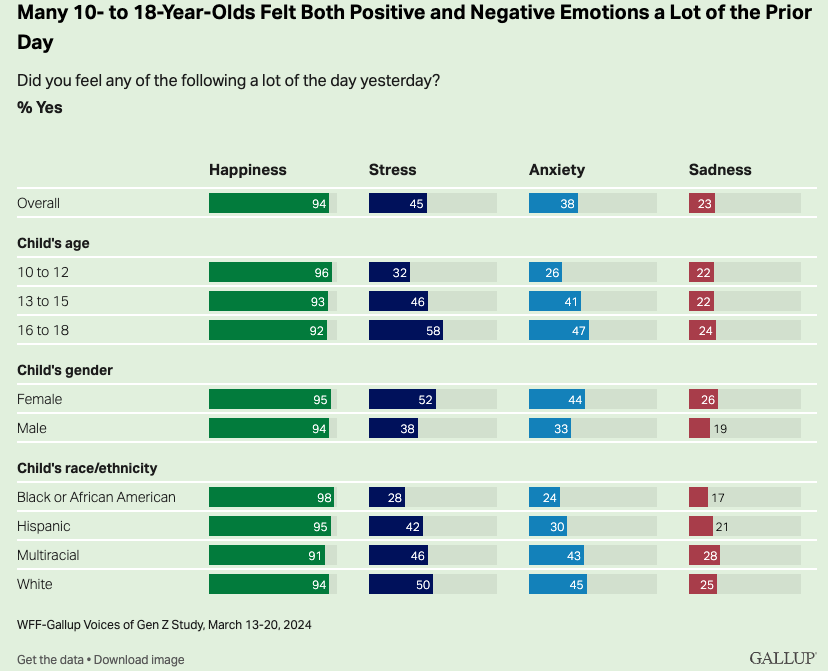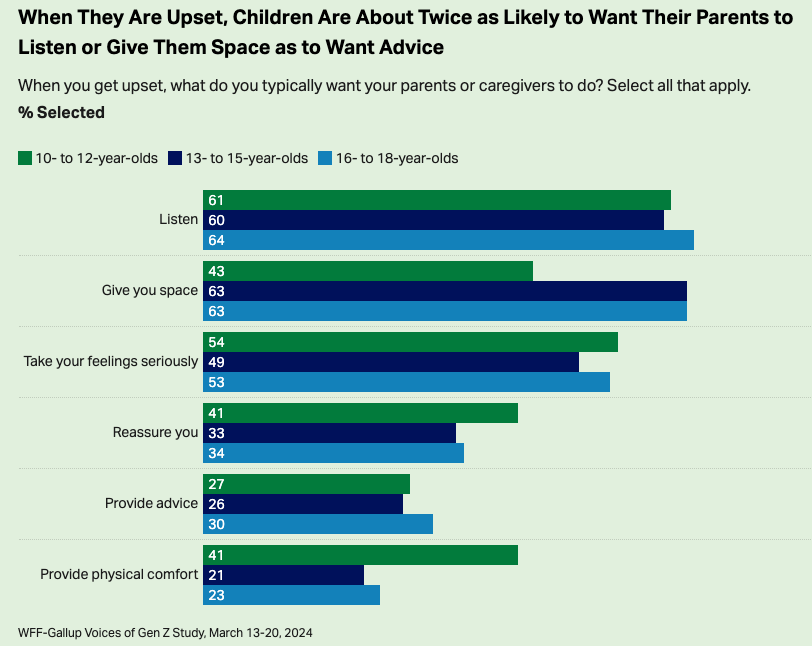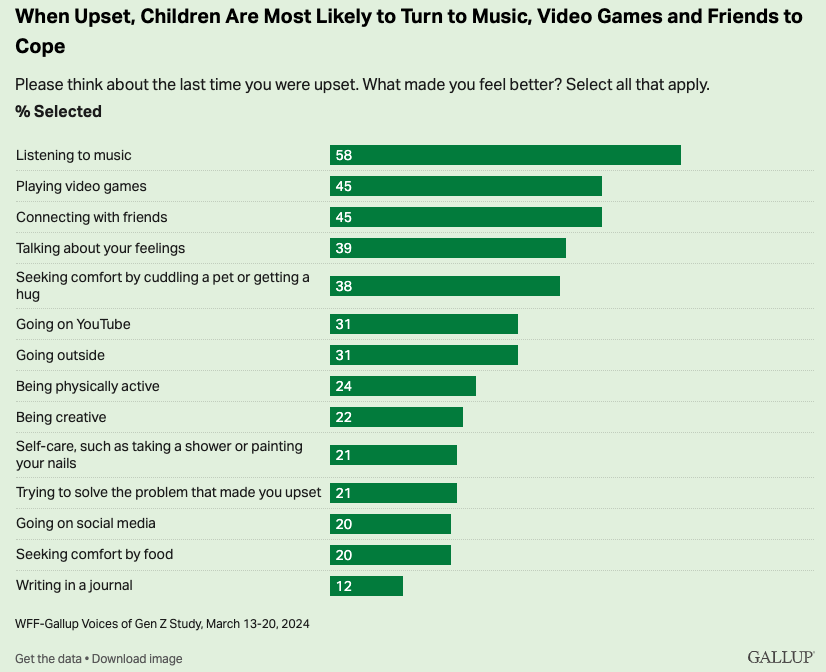The best way for parents to comfort anxious, sad or stressed-out youth is simply to let them vent, according to a new survey by Gallup and the Walton Family Foundation.
“Generation Z youth report having a deep arsenal of coping techniques when they are upset, but when it comes to what they want from their parents in those situations, listening is more important than giving advice and reassurance,” Gallup reported.
Generation Z is composed primarily of teens and young adults, including the focus of the study, people from 10 to 18 years old.
The March 2024 poll surveyed 1,675 young people in the 10-18-year-old cohort, in addition to one of their parents or guardians. It is part of a larger research project on the lives of Gen Z conducted by the foundation and Gallup.
The recent study also tracked the complicated and ever-shifting emotional experiences of its respondents.
“It finds that, rather than being completely positive or completely negative, the emotional lives of preteens and teenagers are complex,” Gallup said. “Nearly all of these children (94%) say they felt happiness a lot of the prior day; however, 45% also felt stressed, 38% anxious and 23% sad.”
Age groups experiencing the most stress the previous day were between the ages of 16 and 18, at 58%. They also led in anxiety (47%).

Girls and boys experienced nearly equal levels of happiness the day before being surveyed, at 95% and 94%, respectively. But girls outpaced boys in stress (52% to 38%), anxiety (44% to 33%) and sadness (26% to 19%), the survey found.
Black youth reported experiencing the highest levels of happiness the previous day, and were lowest in stress, anxiety and sadness.
Black youth reported experiencing the highest levels of happiness the previous day, at 98%, and were lowest in stress (28%), anxiety (24%) and sadness (17%). Multiracial youth were lowest on happiness (91%) and highest on sadness (28%).
Gallup also surveyed one of each youth’s parents or guardians on how they handle their children’s emotional states. Roughly a third of adult respondents said they either agreed or strongly agreed their children experience “very intense” emotions.
White parents (40%) and adults with children between 10 and 12 years old (40%) were among those most likely to report children with very intense emotions. Black parents (25%) and those in the father-daughter grouping (27%) were last in reporting children with very intense emotions.
“Additionally, parents who are the same gender as their children — i.e., mothers and daughters, as well as fathers and sons — are more likely than the different-gender parents to say their child has very intense emotions,” Gallup noted.
Among mothers with daughters, 45% reported youth with very intense emotions, while 38% of fathers with sons said the same, according to the study.
Among mothers with daughters, 45% reported youth with very intense emotions, while 38% of fathers with sons said the same, according to the study.
“About one in six parents say they struggle to comfort their children when they are upset (16%) or communicate effectively with them (15%),” the report said. “Younger parents are most likely to report struggling to comfort their child and communicate with them. Parents of 13-15-year-olds are also especially likely to report struggling to communicate with their child (19%).”

Parents aged 34 and younger and mothers with daughters reported struggling the most with their children’s emotional spikes. Among younger parents, 21% feel helpless, and 15% struggle to communicate, while 21% and 19% of mothers with daughters answered likewise.
Gallup also asked youth to share how they want to be comforted by parents during bouts of emotional upheaval.
Their answer was “less is more: 62% say they want their parents to listen to them when they are upset, and 56% want their parents to give them space. Meanwhile, about half as many children (28%) want their parents to give them advice when they are upset.”
Providing assurance, advice and physical comfort scored lower among most Gen Z, though fluctuations were measured between age groups, Gallup explained.
“Preteens and teenagers have different preferences for how they want to be supported when they are upset. Teenagers are more likely than 10-12-year-olds (preteens) to want their parents to give them space (63% to 43%). Meanwhile, preteens (41%) are about twice as likely as teenagers (an average of 22%) to want their parents to provide them with physical comfort.”
The study found youth have numerous ways to work through their emotional disturbances, including listening to music (58%), playing video games (45%), connecting with friends (45%), talking about feelings (39%) and seeking comfort with a pet or receiving a hug (38%), Gallup said.

“Male and female Gen Zers each have unique ways of coping with their emotions. Two-thirds of Gen Z boys prefer to play video games when they are upset, which is about three times the rate for girls (23%). Gen Z boys also are more likely than girls to engage in physical activity or spend time on YouTube when they are upset.”
Girls, meanwhile, “are notably more likely than boys to say they prefer to listen to music, talk about their feelings, seek physical comfort, connect with friends, browse social media, be creative, write in a journal and engage in self-care when they are upset.”
Related articles:
Similarities in parent-child religious and political adherence remain strong
3 big questions can open a dialogue between adults and teenagers
Survey says: When parents reduce church attendance, so do their teens
When a teenager gets kicked to the curb by Christian parents


